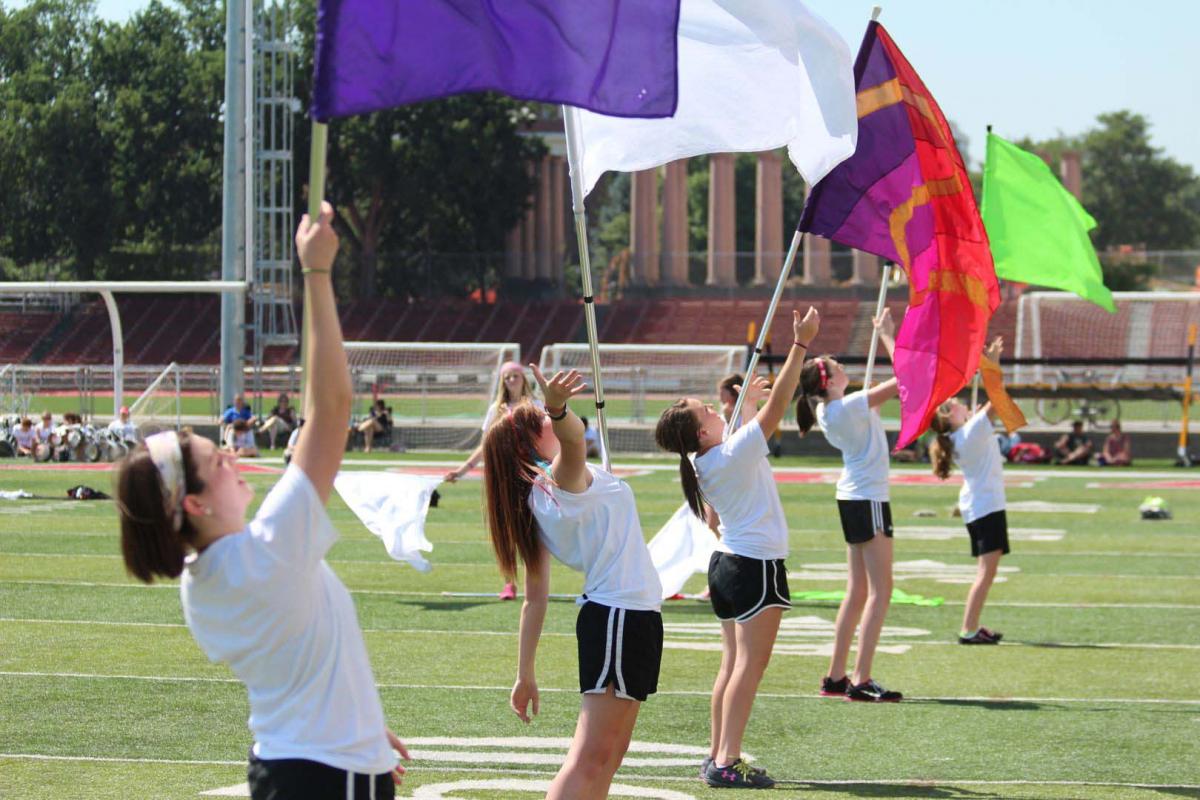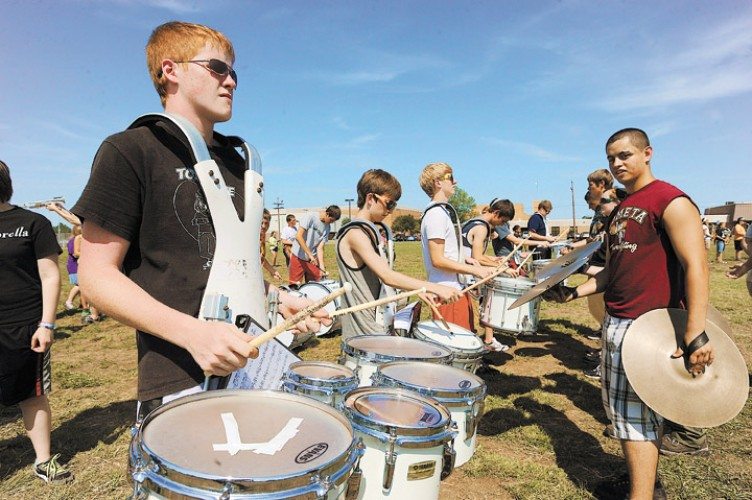By Emeline Beltran
Band camp is just around the corner! Whether your ensemble travels up to a campsite in the mountains, or rehearses at the comfort of your own school campus, it’s sure to be hot and a learning experience. Band camp is universally known as the five-day period of hour long rehearsals under the sun. This time is used for the marching band and color guard to come together as one to start piecing together this year’s field show. This week is going to require a lot of mental and physical preparation, focus, and good health to assure a productive week, for you the performer, and for the ensemble as a whole. However, here are some useful tips on how to survive band camp this year, and onward!
1. Pack ahead of time.
Prepare a list of the essentials you need to bring for the week, then buy and pack several days before the start of the week. The night before your first day of camp should be saved for double-checking.
For the week, your attire should be athletic clothes that are light and comfortable enough to march in under the sun. Light jackets and sweats can be brought if your rehearsal will go until the night time, but aren’t necessary, since the weather of summer nights aren’t too cold. However, whether up the mountains can get cold, so if applicable, bring clothes to keep warm and a sturdy sleeping bag. Closed-toe shoes are a must for the week; if you’re going to be at a campsite, slippers are recommended to use in the cabins, especially their showers. Some useful accessories to help minimize heat include hats, visors, and sunglasses. For those with long hair, remember to bring hair accessories, such as clips, bobby pins, headbands, and hair ties, to keep your hair out of the way, which prevent distractions from marching or playing.
Your music, drill coordinate sheets, equipment, and instruments are all absolute necessities. Forgetting even one of these items prevents a smooth rehearsal and slows down the learning process for not just yourself, but for the rest of the ensemble, including your directors. There are also additional rehearsal supplies that may not be needed at every rehearsal, but great to always keep handy such as band-aids, skin tape, paper clips, and pencils.
Lastly, be mindful of your hygiene and health. When you don’t stay cool enough in the heat, it could lead to consequences on your health, such as sunburns or dehydration. Also, a lot of physical activity will be involved this week, cleanliness should be considered for the sake of yourself and the ensemble. Be sure to bring water, sunscreen, deodorant, tissues, and hand sanitizer. For those going up the mountains, don’t forget shower supplies, such as soap and shampoo.

2. “Early” means “on time”.
Arriving early to practice prevents you from rushing your commute, and gives you time to prepare by yourself. Warm up and stretch on your own once you arrive. Drink water, or eat a small snack. Review music and drill coordinates. Giving yourself time at rehearsal to do your own preparations help you quickly shift into rehearsal mode. Frantically getting there right at the call time or later will leave you flustered for the rest of day.
3. Beat the heat.
Get in the habit of constantly hydrating throughout the day before the week starts. This helps you start balancing your water intake instead of drinking a large amount of water at once when rehearsal starts. Also, remember to apply sunscreen both before and during rehearsal to prevent burns from the morning to late afternoon heat. Hats, visors, and sunglasses will also maximize protection.
4. Food should be hearty and nutritious.
Food is just as important as water! More water breaks will be given than meal and snack breaks, so once you’re allowed to eat, take advantage of that time and eat something filling. From breakfast through dinner, balance your meal with different nutrients, such as vitamins, protein, carbohydrates, and good fats. They’ll provide you with long-term energy, and refresh your body for the next rehearsal period. Avoid all junk food this week; these bad fats and excessive amount of sugar and salt will slow you down.

5. Be courteous to the leadership and chaperones.
Mind your rehearsal manners. Just like classrooms having rules, your conduct in rehearsal should be focused and professional. Listen to anything your section leaders, instructors, directors, or even chaperones ask from you. Your section leaders were given the responsibility of handling a section because the directors trusted the skills and efforts they’ve put forth in years prior to their leadership. As for instructors and directors, they are also making the sacrifice to be out in the heat with you make sure you give them your best effort!
Lastly, the chaperones are spending time that could be used for vacation to volunteer for performers who are passionate about what they do. Don’t be afraid to ask them for anything, because they want to do everything they can to help. However, remember to not take advantage of them, and remember your please and thank you’s!
6. Make new friends.
Band camp is usually the marching band’s first time for all the sections plus the color guard to be together at once. When time permits, such as during meal breaks, get to know other band members outside of your section. Introduce yourself, and make new friends! You are all about to endure a six-month marching season, share the field, and work together as an ensemble to produce fantastic music and visuals. Get to know who you’ll be sharing those moments with. The time in between your first day of band camp to the bus ride home from field show championship finals will go by quicker than you can imagine. Start those connections early to assure a great rest of the season!

7. Have fun!
You can either think of band camp as five days (or longer) worth of long, sweaty, and tiring rehearsals, or you could see it as a week of putting together your show. This will happen while playing, marching, and spinning next to performers just as passionate of this activity as you are. Along with staying focused, having a positive attitude is going to make this week fun for yourself and everyone around you. The adrenaline of performing may not come until later in the season, but for now, put all your effort into this week. Build a positive rehearsal mindset that has your integrity carry on to your effort.
After band camp ends the show and season keeps moving forward. Soon, the show will be ready to perform at your school’s home game halftime show. Several of those performances later, and the show will be done and ready for competition. Make sure you give it your all at band camp; the rest of the season is being built on from here!
 About The Author: Emeline Beltran is a recent graduate of Arcadia High School, formerly a part of the school’s percussion program as a member of the front ensemble. In 2015, she was awarded the WGI Scholarship at the Percussion World Championships. Emeline is also studying Communications at Pasadena City College where she plans to transfer to a four-year university and pursue a career in mass media.
About The Author: Emeline Beltran is a recent graduate of Arcadia High School, formerly a part of the school’s percussion program as a member of the front ensemble. In 2015, she was awarded the WGI Scholarship at the Percussion World Championships. Emeline is also studying Communications at Pasadena City College where she plans to transfer to a four-year university and pursue a career in mass media.






























